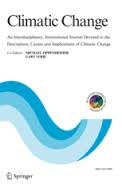Externe Publikationen

Unlearning modernity? A critical examination of the Intergovernmental Panel on Climate Change (IPCC)
Wagner, Niklas / Anna-Katharina HornidgeExterne Publikationen (2025)
in: Climate Change 178 (32), 2-29
DOI: https://doi.org/10.1007/s10584-025-03866-y
Open access
Modernity's ideals of progress through industrialisation, coupled with rationalist viewsof value-free and neutral science guiding policymaking, have been driving forces behindthe climate crisis and related injustices. Post-colonial scholarship calls for unlearning thismodernist paradigm. This study examines the extent to which the Intergovernmental Panelon Climate Change (IPCC), the preeminent global authority on climate change knowl-edge, is both shaped by the procedural logic of Eurocentric modernity and the tendenciestowards unlearning these modernist characteristics in favour of more pluralistic, co-pro-ductive approaches. Through an inductive-deductive qualitative methodology, includingsemi-structured interviews with IPCC authors and policymakers at international climateconferences, this paper finds the IPCC to be situated in a tension field between moder-nity and unlearning it. On the one hand, the IPCC is constrained by path-dependenciesof Eurocentric modernity, manifested in the linear model of knowledge transfer, the dif-ferentiated systems logic of science and policy spheres, and the privileging of Westernscientific expertise as universally valid and apolitical. On the other hand, the study alsoidentifies emergent tendencies within the IPCC towards broadening disciplinary diversity,incorporating alternative epistemologies like Indigenous and Local Knowledge, and fos-tering co-productive collaborations between scientists and policymakers. These nascent"unlearning" efforts signal cracks in modernity's edifice, though limitations and poten-tial risks caution against overstatement. By highlighting this critical juncture, the papercontributes empirical and conceptual insights into the IPCC's transition from modernistconstraints towards more pluriversal climate responses. This analysis sheds light on theIPCC's evolving role in shaping global climate governance and the ongoing struggle toredefine climate knowledge production.
Kontakt
Cornelia Hornschild
Koordinatorin Publikationen
E-Mail Cornelia.Hornschild@idos-research.de
Telefon +49 (0)228 94927-135
Fax +49 (0)228 94927-130
Alexandra Fante
Bibliothekarin/Open Access-Koordinatorin
E-Mail Alexandra.Fante@idos-research.de
Telefon +49 (0)228 94927-321
Fax +49 (0)228 94927-130



